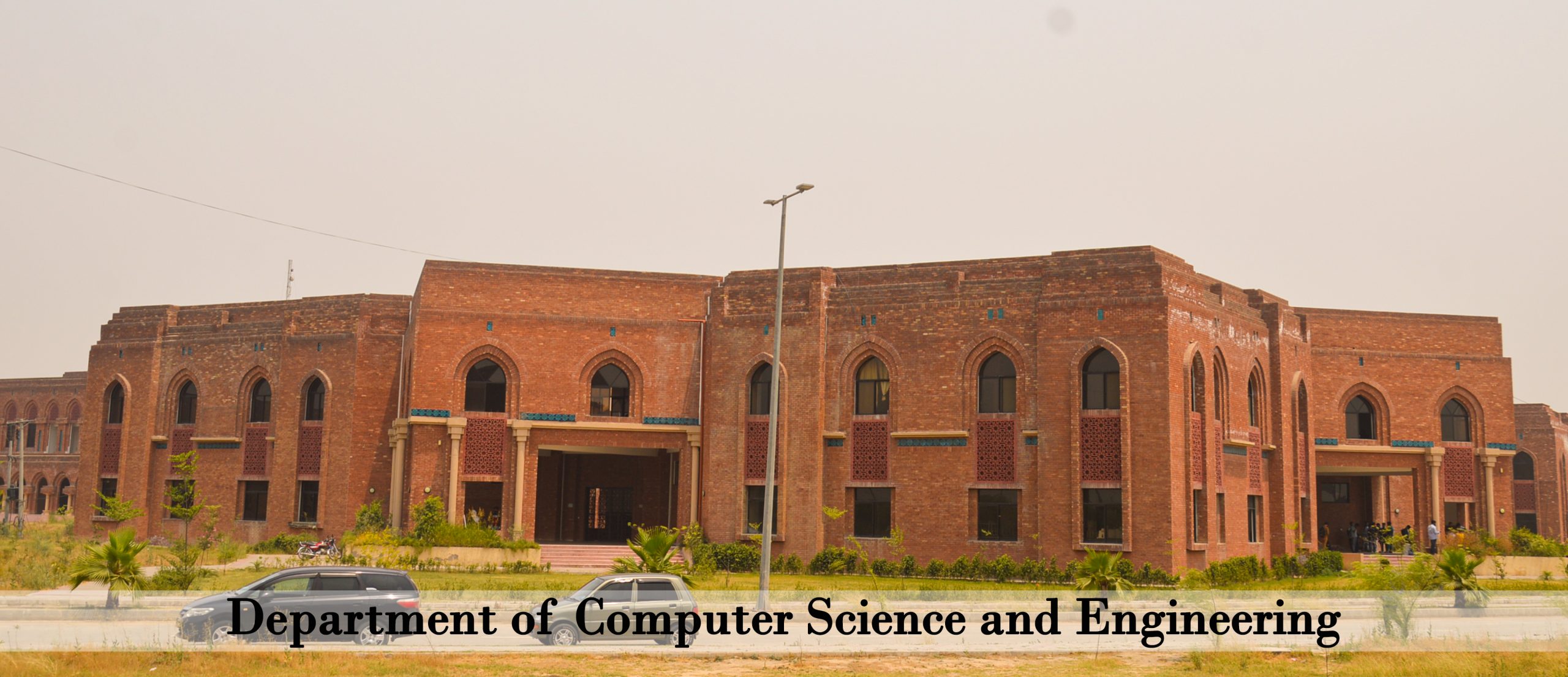Introduction
Department of Computer Science and Engineering, Narowal Campus started working in 2014 at UET Lahore, Narowal. Here the students are given the sterling opportunity to get education of highest standards in pleasant and friendly atmosphere, and to make compatible with their means. The students are laudably facilitated with Well-equipped Laboratories, state of the art Computer Labs with Internet Facility, Multimedia Assisted Classrooms, Innovation Center, unlimited Scholarships and consistently Updated Library. One of the most admirable features of Computer Science and Engineering Department at Narowal campus is its Highly Educated Faculty.
Computer Sciences Program Mission
The mission of Computer Science and Engineering Department is to equip the students with up-to-date curricula of Computer Science and Engineering disciplines, to ensure that the students have the solid foundations in core concepts in computing, to train them in problem solving and decision making skills and to prepare them for lifelong learning in the discipline. We are committed to develop an array of skills and techniques, personal qualities and attributes essential for successful performance in working life and thereby enabling learners to make an immediate contribution to the computing industry. The true spirit of the Computer Science and Engineering Department lies in its simple maxim; “Quality Education with affordable Fee Structure”.
Computer Science Program Educational Outcomes (PEO’s)
PEO-1
Graduates demonstrate theoretical and practical knowledge and skills of computer science to solve real world complex problems.
PEO-2
Graduates demonstrate professionalism, leadership qualities and engage in continuous learning of new developments in diverse fields of computing.
PEO-3
Graduates communicate effectively, work in multi-disciplinary team environment and exhibit and awareness of professional and social responsibility by making an impact of society in an ethical manner.
PROGRAM LEARNING OUTCOMES-PLOS
PLO-1 Academic Education:
Completion of an accredited program of study designed to prepare graduates as computing professionals.
PLO2 Knowledge for Solving Computing Problems:
Apply knowledge of computing fundamentals, knowledge of a computing specialization, and mathematics, science, and domain knowledge appropriate for the computing specialization to the abstraction and conceptualization of computing models from defined problems and requirements.
PLO3 Problem Analysis:
Identify and solve complex computing problems reaching substantiated conclusions using fundamental principles of mathematics, computing sciences, and relevant domain disciplines.
PLO4 Design/Development of Solutions:
Design and evaluate solutions for complex computing problems, and design and evaluate systems, components, or processes that meet specified needs.
PLO5 Modern Tool Usage:
Create, select, or adapt and then apply appropriate techniques, resources, and modern computing tools to complex computing activities, with an understanding of the limitations.
PLO6 Individual, Teamwork, and Project Management:
Function effectively as an individual and as a member or leader of a team in multidisciplinary settings and perform project management activities.
PLO7 Communication:
Communicate effectively with the computing community about complex computing activities by being able to comprehend and write effective reports, design documentation, make effective presentations, and give and understand clear instructions.
PLO8 Computing Professionalism and Society:
Understand and assess societal, health, safety, legal, and cultural issues within local and global contexts, and the consequential responsibilities relevant to professional computing practice.
PLO9 Ethics:
Understand and commit to professional ethics, responsibilities, and norms of professional computing practice.
PLO10 Life-long Learning:
Recognize the need, and have the ability, to engage in independent learning for continual development as a computing professional.
Programs
- B.S. Computer Science (Intake- 150 Seats)
- B.Sc. Computer Engineering (Intake- 50 Seats)
- M.Sc. Computer Science (Evening)
Regulatory Status
The undergraduate program of Computer Science and Engineering Department at Narowal Campus is accredited by NCEAC (HEC) and achieved W-Category.
Alumni
Six Batches of Computer Science and Engineering Department with a total of 165 students have graduated and the alumni are working in various national and international organizations.
Extra-Curricular Activities
Gaming Competitions, Software Exhibitions, Free-lancing, Sports Activities, Annual Dinners, Debating Activities, etc. also managed by CODATOR Society, under the supervision of Department.
Faculty members








